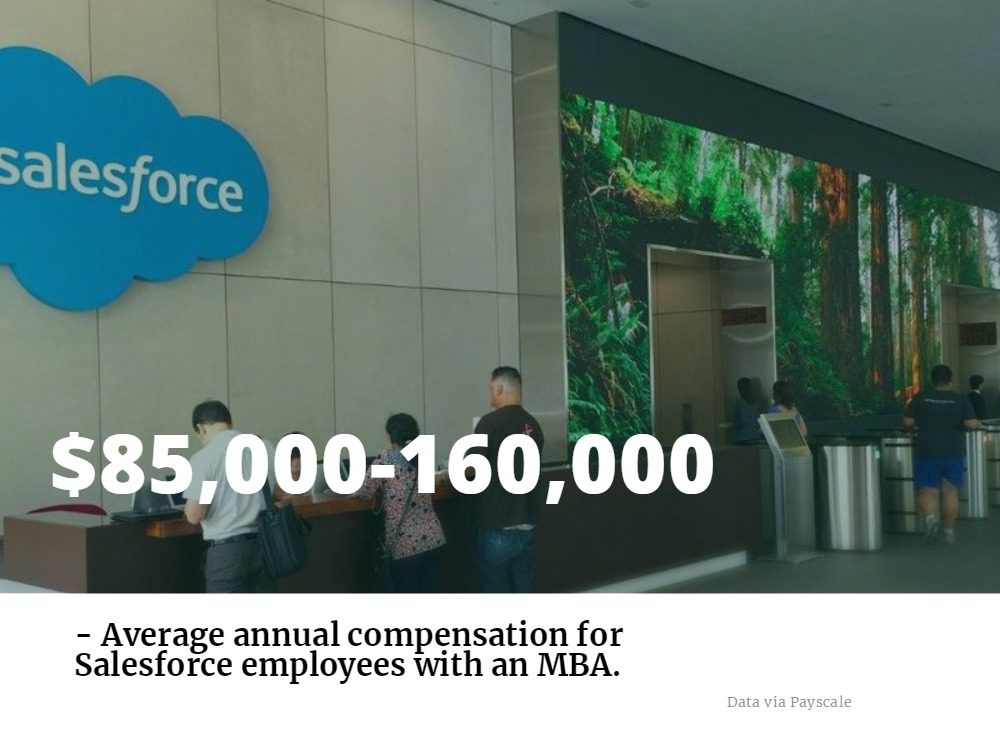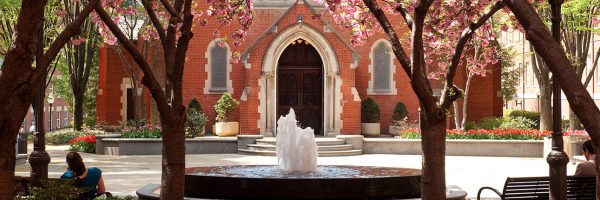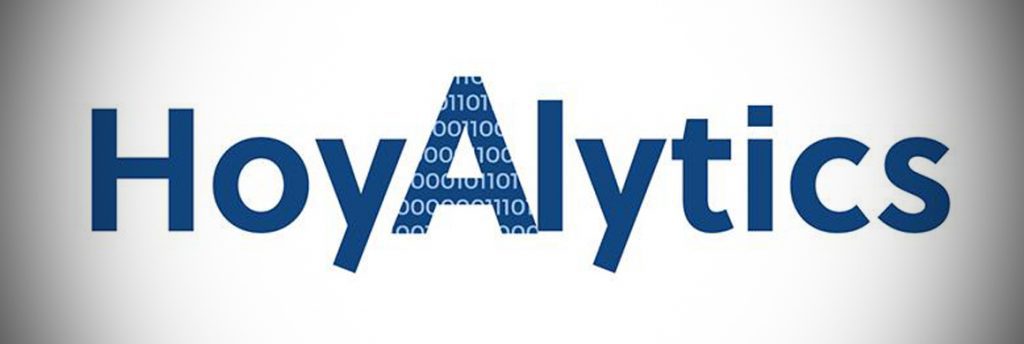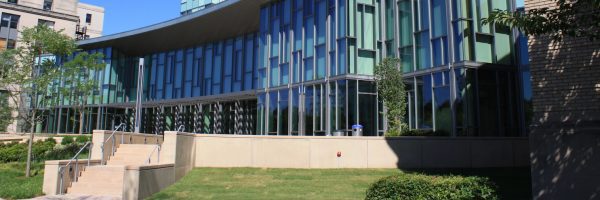How Can You Score a Job at Salesforce with an MBA?

Salesforce, one of the country’s highest valued cloud computing companies, is actively looking for promising MBA graduates, offering diverse opportunities in tech, business, and sales. Since it’s founding in 1999, Salesforce has been growing wildly, becoming the first enterprise cloud company tor each $10 billion in revenue as of August 2017. And Salesforce isn’t just remarkable for its product’s success—the company was also rated as the “#1 Best Company to Work For” by Fortune.
The Salesforce culture is centered around the idea of “Ohana” (Hawaiian for “family”), and earned its place at the top of the list by offering incredible benefits to its employees—both monetary and mentally. It’s understandable why MBA’s would want a job at Salesforce Ohana, with their focus on helping strong performers find new challenges and opportunities for growth.
What Does Salesforce Look for in New Hires?
Salesforce makes recruiting a priority at every level through their Futureforce University recruitment program. Salesforce offers new hires the same incredible opportunities available to all of their employees—seven days of paid time for volunteering, networking opportunities, and access to the Executive Lunch & Learn and Speaker Series that puts interns and new hires in direct contact with Salesforce leadership.
Because of Salesforce’s focus on having their employees give back to their communities, they seek out new hires who have made a demonstrated impact within their past efforts, whether at school or professionally. In 2015, Salesforce’s senior vice president of global recruiting, Ana Recio, commented on the different ways applicants could make themselves stand out.
“What did you do to differentiate your job from others?'” she said. “What was your absolute impact, your legacy? We always look for people who truly were kind of thought leaders and change agents.”
How to Get Your Foot in the Door?
MBA graduates and current students can apply directly for open roles. Current students will most directly benefit from the company’s MBA internship: a 12-week program that students can pursue during the summer in between years one and two of their program. Each summer, MBA interns are hired in the fields of product marketing, product management, CSG business analyst, corporate development, and data analytics. If recruiters think there might be a good fit, applicants will likely be given a 30-60 minute phone screening, followed by an interview with a hiring manager. Before offering the position, MBAs will likely have to partake in a panel interview/case study, presenting their professional and academic accomplishments.
Salesforce also recruits recent graduates (those who graduated in the last 12 months) in the fields of tech, sales, and business. The precise roles and interview process for each varies depending on the field.
How Well Does a Job at Salesforce Pay?
The majority of hires at Salesforce, both full-time and interns, are for tech-centric positions. However, the company does offer supreme compensation for those with business degree backgrounds—especially those with an MBA.
According to Payscale data, MBA graduates wit a job at Salesforce earn between $85,000 and $160,000 USD annually.

It’s no secret that one of the reasons Salesforce tops the Glassdoor list of “Best Places to Work” is the compensation. Although, as with any position, salary will vary depending on a number of factors, Glassdoor’s compensation of full-time employees shows a lower-end salary range of $60,000-80,000 annually (for account executives and sales engineers) and upwards of $141,000 for senior engineer positions.
What Do Current and Former Salesforce Interns Think?
Danielle, who interned with Salesforce as a product marketing MBA intern, commented on her work experience and Salesforce’s company culture in this video. “Not only am I working on independent projects as part of the internship, but I’m also shadowing people in my team and really seeing what a true day in the life is for a project manager within the app cloud,” Danielle said. “Other internships are very focused on their projects and feel very siloed but here at Salesforce I’m really able to be integrated with the team as a whole.”
Eamon, a software engineer who began at Salesforce as a recent graduate, also commented on his experience. “As a new grad what’s interesting is there really is no pathway you’re supposed to follow, it’s what you make of it,” he said. “It’s the people you go out of your way to meet, the experiences you make, the projects you decide to take on.”
Tech’s Greatest Age of Innovation Happened Already, According to New Stanford Research

As each individual technological revolution changes the pace of advancement, new data from the Stanford Graduate School of Business reveals the a small handful of years changed our technological trajectory more than any time in human history.
Georgetown McDonough MBAs Launch HoyAnalytics Club

A group of Evening MBA students at the Georgetown University McDonough School of Business recently launched HoyAnalytics—a student organization focusing on statistics and data analytics. Though the club is is pending official sponsorship by the MBA Program Office, it has drawn a lot of interest in the McDonough School of Business.
According to the McDonough School, HoyAlytics is the first club organized by Evening MBA students. The organization’s board is made up of both full-time and Evening program students, and was created with unifying the two MBA programs in mind.
But the organization’s two main objectives are to create a community for those interested in statistics and analytics, as well as help those who are not already data-savvy gain quantitative skills. As statistics and analytics have become prevalent in more and more industries, HoyAlytics hopes to prepare MBAs for their careers.
“The club is on the cutting edge,” said Kenny Tan (MBA’19), one of the HoyAlytics founders. “Students are taking it in their own hands to make things happen.”

According to McDonough, the club recently held a free Excel workshop with nearly 40 full-time and Evening MBA students in attendance, and plans to continue holding workshops to teach different skills and software, such as Tableau, SAS, R, and SQL, as well as inviting guest speakers.
Student organizations and clubs generally provide great networking and professional benefits, such as access to industry leaders, professional development opportunities and the ability to make a real impact. A U.S. News & World Report list describes the following as reasons why it’s a good decision to get involved in a club in college:
- It allows students to become connected to their school
- It helps them build community
- It allows them to discover their passions and strengths
- It’s a résumé builder
- Sometimes, busier people do better
- Utilize your school’s resources
Check out some of the coolest MBA clubs and student organization’s in the Washington DC Metro here.
Robinson Opens Georgia’s First Business School-Based Fintech Lab

A new fintech lab has opened at the Georgia State University’s J. Mack Robinson College of Business, covering topics of finance, real estate, data analytics, risk management, insurance, and more.
Discover How Elective Courses Work for the Foster Hybrid MBA Program

Beyond the traditional full-time and part-time MBA program options available at the University of Washington’s Foster School of Business, there is also the Hybrid MBA program. This unique work-compatible MBA option allows students to complete 95 percent of their program work online with only 5 percent of sessions requiring a visit to the campus. It’s a two-year program that’s ideal for working parents, business travelers, and young professionals.
In a recent Foster blog post, the school broke down how elective courses work as part of the Hybrid MBA. Just like for full-time and part-time students, hybrid students can enhance their academic studies by enrolling in five, unique two-credit elective courses during their second year.
Here’s how it will work. The Hybrid MBA is broken down into four quarters:
- Q1: Autumn, year one
- Q2: Spring, year one
- Q3: Autumn, year two
- Q4: Spring, year two
During quarter one of the Hybrid MBA, all students are required to participate in a preference survey. This survey reveals the areas of knowledge that are most interesting to the class. From there, the program team and faculty work together to determine which course topics and, thus, electives would best fit the Hybrid MBA class. Then, early in their second quarter, students receive a list of all possible electives—broken down by quarter—so that they can begin to plan their coursework for year two.
As for when students start to take their electives and how many electives they can choose between:
- Three courses offered: Students choose one elective during autumn, year two.
- Four courses offered: Students choose two electives during winter, year two.
- Four courses offered: Students choose two electives during spring, year two.
All elective courses are determined based on the interest survey completed by the Hybrid MBA students. Most often, the areas of highest interest include Finance, Entrepreneurship, Marketing, Leadership, and Data Analytics. It’s important to note that elective courses are, most likely, only offered once during the second year, so if a student sees an elective they want, they should take it when they have the opportunity.
To learn more about how the Hybrid MBA program works, take a look at this infographic designed by the Foster School.
Sloan Startup Uses Data to Out-Design Bottled Water

Bottled water is a problem, but how can you “out-design” it? Sean Grundy, Frank Lee and Eliza Becton, a trio of MIT Sloan 2013 alumni, recently earned another round of investment funding for their smart water cooler company Bevi, which uses data to tap into the bottled water market.
